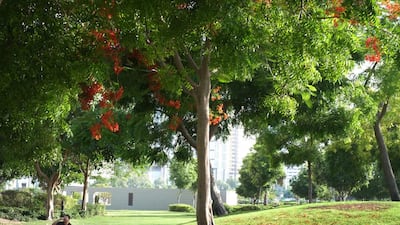In the past few months, youth suicide has been both a frequent newspaper headline and a topic of conversation for many families in the UAE, including mine. While those conversations were triggered by some recent incidents in this country, we are aware that suicide is one of the leading causes of death among teenagers around the world.
We know there are various psychological issues that teenagers wrestle with, and that these sometimes lead to them taking their own lives. What many of us don’t realise is that there is a correlation between physical space and mental illness.
A 2011 study by a team of international scientists, led by Dr Jens Pruessner of the Douglas Mental Health University Institute in Quebec, found that the parts of the brain dealing with stress and emotion are affected by living among crowds. The findings help explain why individuals who are born and raised in urban areas are more likely to suffer from anxiety and depression than those brought up in the countryside.
The incidence of such mental problems “is almost doubled for individuals born and brought up in cities”, Dr Pruessner pointed out in the study, published in the journal Nature. Previous research has also shown that the risk of anxiety disorders is over 20 per cent higher for people from the city “who also have a 39 per cent increase for mood disorders”.
Reading these findings prompted me to look back at my own teenage years spent in India.
The school where I studied had a unique environment. The founder, the poet Rabindranath Tagore, believed that a child’s education must take place in natural surroundings and that education estranged from nature would bring untold harm to young children. Like the English poet William Wordsworth, he envisaged nature as the best teacher that would provide children with the necessary circumstances in which to acquire knowledge.
The result of his conviction was that we had no brick-and-mortar classrooms. Lessons were imparted under trees. It was a strange sight for many, especially those who came from abroad and saw children roaming the campus in an unusually carefree manner, climbing trees and playing under the open sky in the monsoon and in summer. These weren’t distractions. Nor was there any lack of discipline as many might imagine. Unfortunately, the sight of this extraordinary simplicity scared away many parents who had come from big cities to have their children admitted. That’s not to say everything was perfect, of course. Childhood never is.
If such a model of education is practically impossible to implement today in most parts of the world, it’s not always as hard to provide a bit of nature for children even in urban settings.
“[Nature] has a therapeutic value,” says Dr Tharaka Rani Sreekumar, a psychologist at the American Centre for Psychiatry and Neurology in Abu Dhabi. “The less exposure to open, natural spaces, the more neutral or negative the individual’s response and corresponding sense of well-being.”
An elderly neighbour in Delhi once told me that making physical contact with a tree can help us alleviate stress and hold on to more positive energy. “If you are feeling anxious, sad, drained or tense, then try hugging a tree,” she advised.
This is the point Roger Ulrich, a US-based researcher, probably sought to establish by trying to link faster recovery of hospitalised patients with them being able to see trees from their windows. He suggested that “the benefits of visual encounters with vegetation may be greatest for individuals experiencing stress or anxiety”.
Although I dismissed my neighbour’s advice back then, I began to realise its worth after moving to Abu Dhabi, where my life is largely confined to travelling in a car and visits to shopping malls.
A teenager’s mental health depends on a range of factors. “Even a small thing like changing school can have a massive psychological effect on a child,” notes Dr Dolly Habbal, a clinical psychologist at Gulf Diagnostic and Medical Centre in Abu Dhabi.
The problem is so vast that no one has been able to find a definitive answer. But there is a broad-spectrum medicine that might sometimes work: nature.
In the UAE, we could look at providing more parks and trees along some of the roads. Providing an appropriate balance of green space in our urbanised existence is one of the great challenges for governments and town planners everywhere. But the costs of not doing so, to individuals and to society, could potentially be enormous.
smukherjee@thenational.ae

